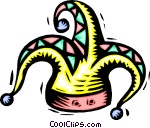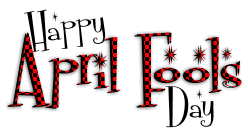Now that spring is officially here, April Fool’s Day is not far around the corner.
 The origin of this particular day is not altogether clear, but some say the “holiday” goes back to medieval days in 1582, when the Gregorian calendar we know today was introduced by Pope Gregory XIII. The New Year was previously an eight-day holiday that began on March 25th and finished on April 1st, or the Feast of Annunciation. In 1582, the New Year was moved to January 1st instead. The story is told that because news about this change traveled slowly, those who did not hear about it—or those who did but refused to make the change—were labeled as “fools” and sent on fool’s errands. Over time, a custom of prank-playing evolved that took on different forms in various parts of the world. How quickly this custom spread of playing tricks on others on a particular day of the year, however, is not clear, since England, for example, did not adopt the Gregorian calendar until 1782, yet April Fool’s Day was still being celebrated. In the 1300s, Geoffrey Chaucer wrote about April Fool’s Day in his Canterbury Tales long before the Gregorian calendar was adopted.
The origin of this particular day is not altogether clear, but some say the “holiday” goes back to medieval days in 1582, when the Gregorian calendar we know today was introduced by Pope Gregory XIII. The New Year was previously an eight-day holiday that began on March 25th and finished on April 1st, or the Feast of Annunciation. In 1582, the New Year was moved to January 1st instead. The story is told that because news about this change traveled slowly, those who did not hear about it—or those who did but refused to make the change—were labeled as “fools” and sent on fool’s errands. Over time, a custom of prank-playing evolved that took on different forms in various parts of the world. How quickly this custom spread of playing tricks on others on a particular day of the year, however, is not clear, since England, for example, did not adopt the Gregorian calendar until 1782, yet April Fool’s Day was still being celebrated. In the 1300s, Geoffrey Chaucer wrote about April Fool’s Day in his Canterbury Tales long before the Gregorian calendar was adopted.
Despite the lack of clarity about what actually brought about April Fool’s Day, it is a fact that the custom has spread worldwide. In Scotland, for example, April 1st is known as Taily Day, when pranks involving the lower extremity of the body take place. The “butt” of these jokes is called a “gowk,” which is a Scottish word for cuckoo bird. If you have ever seen signs saying “Kick me,” these are likely related to Scottish customs on April Fool’s Day. In England, jokes are played on a person only in the morning, since it is considered bad luck to do so after noon. A fool is known as a “gob” or “gobby,” and the victim of a prank is called a noodle. In Italy, April Fool’s Day is known as the Festival of Hilaria and takes place on March 25th, celebrating the resurrection of a god known as Attis. In Portugal, on the Sunday and Monday before Lent, people throw flour at each other. In India, on March 31st, people play jokes and smear paint on each other in anticipation of spring. Mexico celebrates April Fool’s Day on December 28th, but it is only in modern days that it has adopted the custom of playing pranks and performing tricks; Mexico’s original holiday involved a remembrance of the children killed by King Herod. French children tape a paper fish on classmates’ backs, and when this is discovered, call out “Poisson d’Avril,” or “April Fish.”
 In some ways the origin of April Fool’s Day has become a tall tale. In 1983, for example, a Boston University professor named Joseph Boskin was interviewed by an Associated Press reporter about the origin of April Fool’s Day. He joked that he had been researching this for years, but the reporter took him seriously, and the news spread about the professor who had cracked the mystery of April Fool’s Day. The professor, meanwhile, embellished his tale by saying the holiday began in Istanbul in the court of Constantine, when the jesters decided to unionize. The king was so amused that he gave up his throne for a day to a jester named Kugel. In reality, Kugel was the name of a Jewish pudding that a friend of the professor enjoyed. The story spread like wildfire to news agencies worldwide. Weeks later, Boskin revealed the story to his students, one of whom was editor-in-chief of the school newspaper and printed the story on the front page the next day. The press—and the reporter—were livid about becoming the victims of a hoax. The professor says he kept his job only because he had tenure. It was not until last year that he finally made peace with the reporter by having lunch with him. Ironically, that same reporter had subsequently become a fellow professor at Boston University.
In some ways the origin of April Fool’s Day has become a tall tale. In 1983, for example, a Boston University professor named Joseph Boskin was interviewed by an Associated Press reporter about the origin of April Fool’s Day. He joked that he had been researching this for years, but the reporter took him seriously, and the news spread about the professor who had cracked the mystery of April Fool’s Day. The professor, meanwhile, embellished his tale by saying the holiday began in Istanbul in the court of Constantine, when the jesters decided to unionize. The king was so amused that he gave up his throne for a day to a jester named Kugel. In reality, Kugel was the name of a Jewish pudding that a friend of the professor enjoyed. The story spread like wildfire to news agencies worldwide. Weeks later, Boskin revealed the story to his students, one of whom was editor-in-chief of the school newspaper and printed the story on the front page the next day. The press—and the reporter—were livid about becoming the victims of a hoax. The professor says he kept his job only because he had tenure. It was not until last year that he finally made peace with the reporter by having lunch with him. Ironically, that same reporter had subsequently become a fellow professor at Boston University.
As far as I am concerned personally, April 1st plays no special role other than that it is my mother’s birthday. My mother, who passed away in 2001, was not much of a prankster, although I do remember one year when she told my brother, Mark, and me that it was snowing. The likelihood of that was slim, since we lived in southern California at the time, but we raced to the window and peered outside. Of course, all we saw was greenery being warmed by the sun. When my mother called out “April Fool’s!” we were not particularly impressed. I honestly don’t recall that tricks were ever played after that, not by my mother and also not between family members and friends—at least not on April Fool’s Day. I must be honest; this holiday whose sole purpose is to poke fun at others at their expense does not particularly appeal to me. However, that does not mean I cannot change the custom. If you are reading this post today, mark April 1st on your calendar and visit any of my shops on Etsy (accessible through the dropdown menu at the top of this Web page) on that day. Purchase anything on April 1st and get free shipping by using the coupon code APRILFOOLSDAY2011 during the checkout process.

© 2011 Judy Nolan. All rights reserved.

What an informative post! I like your clever ending with a shop discount!
What an interesting bit of information! I loved learning this bit of history that I can pass along this week. Like you, I am also not a big fan of April Fool’s Day… but I LOVE how you decided to be a catalyst to change the future and that it is starting with you. Everything begins with one person :-).